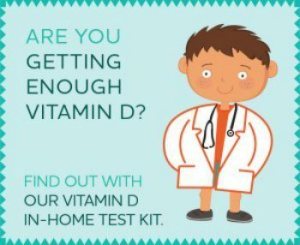There are Amazingly Few
Vitamin D Contraindications
There are an extremely small number of Vitamin D Contraindications. Even though everyone knows that you can Overdose on Vitamin D, it is actually EXTREMELY hard to overdose andvitamin d has an undeservedly bad reputation for this potential for overdose.
But in studies, vitamin d side effects are EXTREMELY rare and most studies use the term 'remarkably free' of side effects to describe their studies. While there are SOME Vitamin D Contraindications, they are extremely few. Remember, if your condition is on this list and your doctor gives you vitamin d, DON'T PANIC, these are NOT conditions that necessarily prevent you from taking vitamin d. These are only conditions in which you must get the OK from your doctor BEFORE you take ANY vitamin d- and in which you should be monitored more closely than people without these conditions.
High Calcium Levels are
Vitamin D Contraindications
High Blood Calcium Levels or conditions that can lead to high calcium levels such as:
- High Calcium Levels
- Sarcoidosis
- Tuberculosis
- Parathyroid disease
- Having an Organ Transplant
are 'relative' Vitamin D Contraindications. This means that if you have these conditions, have high Blood Calcium Levels or think that you may have any of these problems, then you must NOT take Vitamin D until you get the express permission of your doctor. If your doctor chooses to give you vitamin d, then it should be done in a conservative manner and you should have VERY frequent Vitamin D and Calcium levels in order to make sure that your condition does not worsen with Vitamin D Therapy.

If you do have parathyroid disease and get surgery to correct it, then you should speak to your doctor about starting Vitamin D Therapy because parathyroid disease VERY frequently causes vitamin d levels to drop in order to prevent calcium levels from rising further. Vitamin D therapy will often get overlooked in these cases and you are left with untreated severe vitamin D deficiency. After correction of the parathyroid disease, many people expecting to feel better still feel AWFUL months later with continuing Vitamin D Deficiency.
Kidney Stones
A History of Kidney Stones is NOT one of the Vitamin D Contraindications, nor does vitamin d create an increased risk for kidney stones- even in stone formers. There are several studies that show CALCIUM supplements may increase the risk of kidney stones, but there has been no correlation with kidney stones to vitamin d. In fact, one study specifically EXCLUDED vitamin d as a risk factor for increasing kidney stone formation and Preventing Kidney Stones may have much more to do with TAKING magnesium, potassium and vitamin b6 than AVOIDING vitamin d!
"Sodium, phosphorus, sucrose, phytate, vitamin B6,
vitamin D, and supplemental calcium were not
independently associated with risk [of kidney stones]"
Dietary Factors and the Risk of
Incident Kidney Stones in Men
While people who are stone formers seem to always be worried about taking vitamin d, there is just simply no evidence that vitamin d contributes to increased kidney stone formation. The risks of Vitamin D Deficiency Symptoms should make stone formers realize that missing out on this important vitamin can have severe health consequences. Being a stone former is NOT one of the vitamin d contraindications!
Renal Failure/Kidney Failure
Kidney Failure and even dialysis are NOT vitamin D contraindications. The use of Vitamin D is very well studied in those with kidney failure and seems to be quite beneficial in terms of improved mood, prevention or delay of hyperparathyroidism and even improved survival rates.
"In this historical cohort study, chronic
hemodialysis patients in the group that
received injectable vitamin D had a
significant survival advantage over
patients who did not."
Activated Injectable Vitamin D
and Hemodialysis Survival
Increase In Pain
Upon Taking Vitamin D
An increase in pain symptoms after starting Vitamin D Therapy are not infrequent vitamin d side effects. These Vitamin D Side Effects are often very worrisome and uncomfortable. Many people want to stop vitamin d therapy due to this pain, but that is not a good idea. In fact, the people who need vitamin D the MOST are most often the ones who experience this pain.
The pain is due to the vitamin d forcing calcium back into demineralized bones. Water is drawn into the bones along with the calcium. This swells the bones very slightly and pushes against the inflexible periosteum. The periosteum has a significant number of pain receptors and this can be experienced as bone pain. For those that already HAVE Pain From Vitamin D Deficiency, the pain can become worse. For those that do not have bone pain already, they can experience bone pain upon first beginning therapy. This bone pain is temporary and should resolve in a few weeks.
Since the pain is an indication of demineralized bones, stopping therapy will be likely to leave these people with bones that continue to become demineralized- potentially leading to osteoporosis. Understanding why the pain is being experienced and attempting to manage it with pain relievers, relaxation, warm baths, etc. is a better idea.
Infants and the Elderly
Neither infancy nor being elderly are Vitamin D Contraindications. In fact, both of these groups are overlooked as groups that probably NEED vitamin d more than other age groups, but are the least likely to get it. One potential consequence of this is the epidemic of heart failure. Both infants and elderly are the most likely groups to suffer from Heart Failure From Vitamin D Deficiency, despite Vitamin D deficiency being a known Cause of Heart Failure.
For the elderly, the high incidence of weakness, pain, disability and falls -each in different studies- have been improved by giving Vitamin D. Vitamin D is also well-known to improve mood, and this is no different for the elderly who frequently suffer from depression.
Subtle vitamin d deficiency in infancy and in utero has been linked to decreased bone density, schizophrenia and increased incidence of cavities later in life. Especially since a large number of even young and healthy women are vitamin d deficient, babies are getting virtually no vitamin d in utero and if they are breast-fed and receive no supplementation, they get no vitamin d from breast milk either. The result is an epidemic of unrecognized vitamin d deficiency in children, which is even leading to a Surge in Rickets in Children in the past few years- a condition that was considered 'eradicated' in the 1900's.
Cancer or Serious Illnesses
contraindications. In fact, vitamin d SHOULD be a required 'standard of care' for nearly every serious illness that there is. It improves the immune system, it improves mood, protects the bones from the demineralization that occurs with dialysis, chemotherapy, steroids and immobility.
"Vitamin D deficient patients with serious
illnesses should not only be supplemented
more aggressively than the well, they should
have more frequent monitoring
of serum 25(OH)D and calcium. Vitamin D
should always be adjuvant treatment
in patients with serious illness…"
The Use of Vitamin D in Clinical Practice
Should patients REALLY have to battle their illnesses with an impaired immune system, depression and, if they survive, have osteoporosis on top of all that? It just doesn't seem like the right thing to do.
Allergic to Vitamin D
While allergy WOULD be a contraindication, however, virtually no one has a true allergic reaction to this vitamin. It's necessary for life! There are some people who get Vitamin D Side Effects like itching, but this is often times due to the ingredients and/or carriers of the actual vitamin d itself. If you BELIEVE that you MAY be allergic to vitamin d because of a rash or itching, you can determine if you TRULY have an allergy to vitamin d supplements in two ways:
1) If you regularly drink vitamin d fortified milk and do not have an allergy, then you do not have an allergy to vitamin d If you have taken multivitamin supplements without problems or you still can take multivitamin supplements without an allergic reaction, then it is not likely that you have an allergy to vitamin d.
2) Can you go out into the sun without having an allergic reaction? If so, then you do not have an allergy to vitamin D. You probably have an allergic reaction to something IN the vitamin d supplements. You could try a Hypoallergenic Lanolin-Free supplement and see if that solves your problem.
Liver Disease or Liver Failure
Liver disease and/or liver failure is NOT one of the vitamin d contraindications. While it takes a healthy liver to convert vitamin d into its active form, it just may simply take MORE vitamin d in order to get blood levels up to recommended Vitamin D Levels. But there is no reason NOT to givevitamin D in cases of liver disease, and every reason that they SHOULD have more vitamin d in order to give their Immune System all the help that it can get!
So, while there are a FEW Vitamin D Contraindications, very few people fall into the one category of high calcium levels that is the only major problem with vitamin d therapy. Most people also worry about overdosing too, keep reading to find out why this is just simply not in issue in the majority of cases.
Next --->
Overdose on Vitamin D
Vitamin D Contraindications Resources
- 5000 IU Vitamin D 3 Supplements- Vitamin D3 is really theONLY vitamin d that you should be taking. Get Vitamin D 3 in a clinically relevant dose for adults
- Vitamin D Liquid- It's also lanolin free and is the only vegan vitamin d3 on the market. This Vitamin D3 is GREAT for kids.
Still Have a Question
About Vitamin D?
Ask It Here!
See Already Answered Questions about Vitamin D
Click below to see Questions About Vitamin D from other visitors to this page...
Taking Vitamin D with a Lanolin and Shellfish Allergy
I am extremely sensitive to lanolin, cannot even get close to wool without itching. I am also allergic to shellfish. Is there a lanolin free and shellfish-free …
Extremely allergic to wool and ANY fish but need to increase Vitamin D
My vitamin D level is at 17 according to a recent blood test. My doctor says to take 3,000 units of vitamin D-3, however all the D-3 I am finding either …
Vitamin D and Calcium
Thanks so much for this informative website! I'm a little confused with some recent blood work. I've included some recent results and a little of my medical …
Parathyroid and Vitamin D
Can vitamin d taken as a supplement be used to control hyperparthyroidism.
__________________________________
ANSWER:
If you have hyperparathyroidism, …
Back to Top of Vitamin D Contraindications
To Easy Immune System Health Home Page




